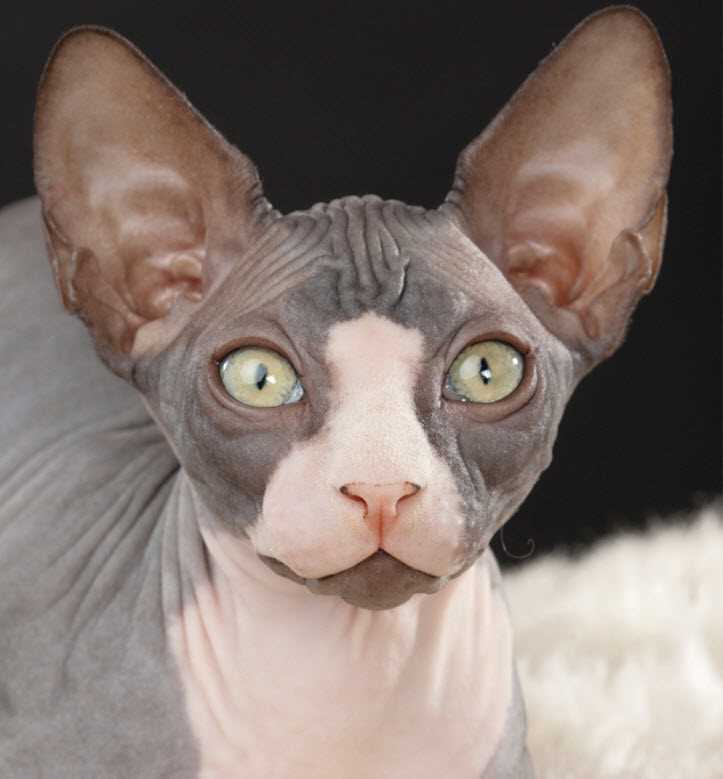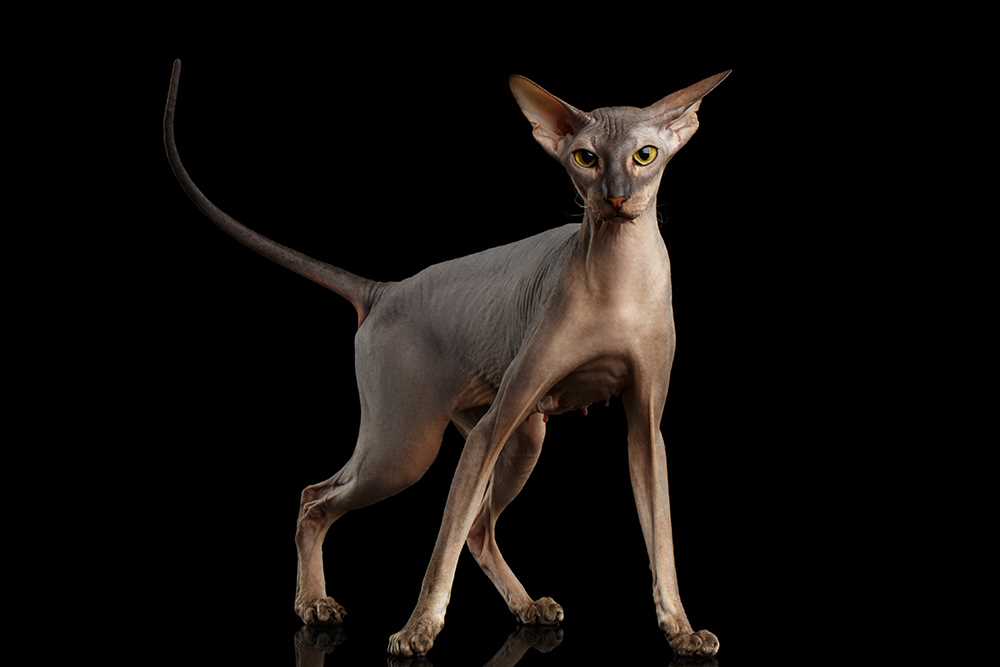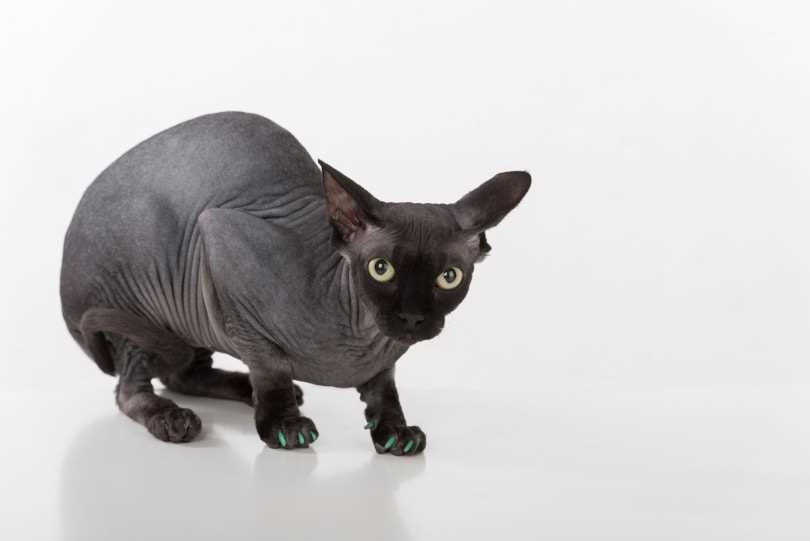



Adopting a Sphynx is a commitment that requires financial consideration. Expect to invest between $1,500 and $3,000 for a kitten from a reputable breeder. This price reflects their unique breeding process and health screenings. Be prepared for ongoing expenses, including quality food, regular vet check-ups, and grooming products.
It’s essential to budget for routine medical care. Vaccinations, spaying or neutering, and preventive treatments can accumulate, averaging around $300 to $600 annually. Additionally, these felines are prone to specific health issues, such as skin conditions, which may lead to higher veterinary bills.
Consider the cost of grooming supplies as well. Despite their lack of fur, Sphynx require regular baths to remove oils that can build up on their skin. Investing in gentle shampoos and skin moisturizers will help maintain their health and comfort.
Pricing Insights for Sphynx Companions

Adopting a Sphynx feline can be quite a financial commitment. Breeders typically charge anywhere from $1,500 to $3,000 depending on lineage, health guarantees, and geographical location. It’s crucial to research reputable breeders who prioritize the well-being of their cats.
Additional Costs to Consider

Beyond the initial purchase price, there are ongoing expenses to keep in mind:
- Veterinary care: Regular check-ups and vaccinations can accumulate costs of around $200 to $500 annually.
- Grooming: Despite their lack of fur, these cats require regular bathing and skincare, totaling approximately $50 to $150 per session when utilizing professional services.
- Diet: High-quality cat food specifically formulated for their needs may cost $30 to $100 monthly.
- Supplies: Litter, toys, and scratching posts can add another $100 to $200 each year.
Unexpected Expenses
It’s wise to be prepared for unforeseen circumstances:
- Health issues: Some Sphynx are predisposed to certain conditions, which could lead to unexpected vet bills.
- Behavioral training: Investing in professional training can enhance your cat’s behavior, adding to your overall costs.
Managing these expenses ensures a happy life for your new companion. Also, if you’re dealing with any odor issues, check out my guides on how to remove cat pee smell from concrete and how to get cat pee smell out of laminate flooring. Keeping your home fresh adds to the joy of having a playful pal around!
Initial Purchase Costs of Hairless Cat Breeds
Expect to budget between $1,500 and $3,000 for a purebred sphinx or similar breed. Factors influencing price include breeder reputation, lineage, and geographic location. Some breeders may charge more for unique colors or patterns.
Breeder Selection
Choosing a reputable breeder is crucial. Look for one who provides health guarantees and allows you to meet the kittens and their parents. This can prevent potential future health issues that may arise from poor breeding practices.
Additional Expenses
In addition to the upfront cost, consider other expenses like initial vaccinations, microchipping, and spaying or neutering. These can add another $200 to $500. Always inquire about these costs with the breeder.
Ongoing Care Expenses for Hairless Cats
Regular grooming is a must for my fellow furless companions. Bathing every few weeks helps keep our skin healthy and free from oils. Budget around $20 to $30 per bath if you go to a professional. If you’re doing it yourself, stock up on high-quality shampoos, which might cost about $10 to $20 each.
Because our skin lacks fur, protect it from sunburn. Sunscreen specifically made for pets costs around $15 to $25. It’s a small price to pay for skin safety during sunny days.
Nutrition plays a significant role in our health. High-quality food is vital, averaging about $40 to $60 monthly. Look for grain-free options or those specifically designed for sensitive skin.
Routine veterinary visits are essential. Expect to spend around $100 to $200 annually for check-ups and vaccinations. If any health issues arise, like skin conditions, the costs can rise significantly, so having a budget for unexpected medical expenses is wise.
Dental care is also important. Regular teeth brushing and dental treats can add up to $10 to $30 each month. Fresh breath and healthy gums contribute to overall well-being.
Lastly, consider pet insurance. Monthly premiums can vary, but budgeting around $30 to $50 can provide peace of mind for any potential health issues.
Factors Influencing the Price of Hairless Cats

Breeding quality significantly affects the cost of these unique felines. Reputable breeders invest in genetics, ensuring that their kittens are healthy and free from hereditary conditions. Kittens from champion bloodlines typically command higher prices.
Age plays a role too. Younger kittens often have a higher price tag, while older companions may be more affordable as they may need more care or have less demand.
Location matters as well. Prices can fluctuate based on regional demand and availability. Urban areas might see higher prices due to increased interest, while rural locations may offer lower costs.
Health certifications and vaccinations also contribute to the final price. Cats with complete health documentation and vaccinations are usually more expensive, reflecting the care and investment the breeder has made.
Coat type and appearance can drive prices higher as well. Unique markings or desirable traits can make certain individuals more sought after, leading to increased market value.
Market trends affect pricing too. Popularity can rise and fall, impacting how much someone is willing to pay for these charming companions. Keeping an eye on trends can help gauge current market conditions.
Adopting a Sphynx is a commitment that requires financial consideration. Expect to invest between $1,500 and $3,000 for a kitten from a reputable breeder. This price reflects their unique breeding process and health screenings. Be prepared for ongoing expenses, including quality food, regular vet check-ups, and grooming products.
It’s essential to budget for routine medical care. Vaccinations, spaying or neutering, and preventive treatments can accumulate, averaging around $300 to $600 annually. Additionally, these felines are prone to specific health issues, such as skin conditions, which may lead to higher veterinary bills.
Consider the cost of grooming supplies as well. Despite their lack of fur, Sphynx require regular baths to remove oils that can build up on their skin. Investing in gentle shampoos and skin moisturizers will help maintain their health and comfort.
Pricing Insights for Sphynx Companions

Adopting a Sphynx feline can be quite a financial commitment. Breeders typically charge anywhere from $1,500 to $3,000 depending on lineage, health guarantees, and geographical location. It’s crucial to research reputable breeders who prioritize the well-being of their cats.
Additional Costs to Consider

Beyond the initial purchase price, there are ongoing expenses to keep in mind:
- Veterinary care: Regular check-ups and vaccinations can accumulate costs of around $200 to $500 annually.
- Grooming: Despite their lack of fur, these cats require regular bathing and skincare, totaling approximately $50 to $150 per session when utilizing professional services.
- Diet: High-quality cat food specifically formulated for their needs may cost $30 to $100 monthly.
- Supplies: Litter, toys, and scratching posts can add another $100 to $200 each year.
Unexpected Expenses
It’s wise to be prepared for unforeseen circumstances:
- Health issues: Some Sphynx are predisposed to certain conditions, which could lead to unexpected vet bills.
- Behavioral training: Investing in professional training can enhance your cat’s behavior, adding to your overall costs.
Managing these expenses ensures a happy life for your new companion. Also, if you’re dealing with any odor issues, check out my guides on how to remove cat pee smell from concrete and how to get cat pee smell out of laminate flooring. Keeping your home fresh adds to the joy of having a playful pal around!
Initial Purchase Costs of Hairless Cat Breeds
Expect to budget between $1,500 and $3,000 for a purebred sphinx or similar breed. Factors influencing price include breeder reputation, lineage, and geographic location. Some breeders may charge more for unique colors or patterns.
Breeder Selection
Choosing a reputable breeder is crucial. Look for one who provides health guarantees and allows you to meet the kittens and their parents. This can prevent potential future health issues that may arise from poor breeding practices.
Additional Expenses
In addition to the upfront cost, consider other expenses like initial vaccinations, microchipping, and spaying or neutering. These can add another $200 to $500. Always inquire about these costs with the breeder.
Ongoing Care Expenses for Hairless Cats
Regular grooming is a must for my fellow furless companions. Bathing every few weeks helps keep our skin healthy and free from oils. Budget around $20 to $30 per bath if you go to a professional. If you’re doing it yourself, stock up on high-quality shampoos, which might cost about $10 to $20 each.
Because our skin lacks fur, protect it from sunburn. Sunscreen specifically made for pets costs around $15 to $25. It’s a small price to pay for skin safety during sunny days.
Nutrition plays a significant role in our health. High-quality food is vital, averaging about $40 to $60 monthly. Look for grain-free options or those specifically designed for sensitive skin.
Routine veterinary visits are essential. Expect to spend around $100 to $200 annually for check-ups and vaccinations. If any health issues arise, like skin conditions, the costs can rise significantly, so having a budget for unexpected medical expenses is wise.
Dental care is also important. Regular teeth brushing and dental treats can add up to $10 to $30 each month. Fresh breath and healthy gums contribute to overall well-being.
Lastly, consider pet insurance. Monthly premiums can vary, but budgeting around $30 to $50 can provide peace of mind for any potential health issues.
Factors Influencing the Price of Hairless Cats

Breeding quality significantly affects the cost of these unique felines. Reputable breeders invest in genetics, ensuring that their kittens are healthy and free from hereditary conditions. Kittens from champion bloodlines typically command higher prices.
Age plays a role too. Younger kittens often have a higher price tag, while older companions may be more affordable as they may need more care or have less demand.
Location matters as well. Prices can fluctuate based on regional demand and availability. Urban areas might see higher prices due to increased interest, while rural locations may offer lower costs.
Health certifications and vaccinations also contribute to the final price. Cats with complete health documentation and vaccinations are usually more expensive, reflecting the care and investment the breeder has made.
Coat type and appearance can drive prices higher as well. Unique markings or desirable traits can make certain individuals more sought after, leading to increased market value.
Market trends affect pricing too. Popularity can rise and fall, impacting how much someone is willing to pay for these charming companions. Keeping an eye on trends can help gauge current market conditions.
Adopting a Sphynx is a commitment that requires financial consideration. Expect to invest between $1,500 and $3,000 for a kitten from a reputable breeder. This price reflects their unique breeding process and health screenings. Be prepared for ongoing expenses, including quality food, regular vet check-ups, and grooming products.
It’s essential to budget for routine medical care. Vaccinations, spaying or neutering, and preventive treatments can accumulate, averaging around $300 to $600 annually. Additionally, these felines are prone to specific health issues, such as skin conditions, which may lead to higher veterinary bills.
Consider the cost of grooming supplies as well. Despite their lack of fur, Sphynx require regular baths to remove oils that can build up on their skin. Investing in gentle shampoos and skin moisturizers will help maintain their health and comfort.
Pricing Insights for Sphynx Companions

Adopting a Sphynx feline can be quite a financial commitment. Breeders typically charge anywhere from $1,500 to $3,000 depending on lineage, health guarantees, and geographical location. It’s crucial to research reputable breeders who prioritize the well-being of their cats.
Additional Costs to Consider

Beyond the initial purchase price, there are ongoing expenses to keep in mind:
- Veterinary care: Regular check-ups and vaccinations can accumulate costs of around $200 to $500 annually.
- Grooming: Despite their lack of fur, these cats require regular bathing and skincare, totaling approximately $50 to $150 per session when utilizing professional services.
- Diet: High-quality cat food specifically formulated for their needs may cost $30 to $100 monthly.
- Supplies: Litter, toys, and scratching posts can add another $100 to $200 each year.
Unexpected Expenses
It’s wise to be prepared for unforeseen circumstances:
- Health issues: Some Sphynx are predisposed to certain conditions, which could lead to unexpected vet bills.
- Behavioral training: Investing in professional training can enhance your cat’s behavior, adding to your overall costs.
Managing these expenses ensures a happy life for your new companion. Also, if you’re dealing with any odor issues, check out my guides on how to remove cat pee smell from concrete and how to get cat pee smell out of laminate flooring. Keeping your home fresh adds to the joy of having a playful pal around!
Initial Purchase Costs of Hairless Cat Breeds
Expect to budget between $1,500 and $3,000 for a purebred sphinx or similar breed. Factors influencing price include breeder reputation, lineage, and geographic location. Some breeders may charge more for unique colors or patterns.
Breeder Selection
Choosing a reputable breeder is crucial. Look for one who provides health guarantees and allows you to meet the kittens and their parents. This can prevent potential future health issues that may arise from poor breeding practices.
Additional Expenses
In addition to the upfront cost, consider other expenses like initial vaccinations, microchipping, and spaying or neutering. These can add another $200 to $500. Always inquire about these costs with the breeder.
Ongoing Care Expenses for Hairless Cats
Regular grooming is a must for my fellow furless companions. Bathing every few weeks helps keep our skin healthy and free from oils. Budget around $20 to $30 per bath if you go to a professional. If you’re doing it yourself, stock up on high-quality shampoos, which might cost about $10 to $20 each.
Because our skin lacks fur, protect it from sunburn. Sunscreen specifically made for pets costs around $15 to $25. It’s a small price to pay for skin safety during sunny days.
Nutrition plays a significant role in our health. High-quality food is vital, averaging about $40 to $60 monthly. Look for grain-free options or those specifically designed for sensitive skin.
Routine veterinary visits are essential. Expect to spend around $100 to $200 annually for check-ups and vaccinations. If any health issues arise, like skin conditions, the costs can rise significantly, so having a budget for unexpected medical expenses is wise.
Dental care is also important. Regular teeth brushing and dental treats can add up to $10 to $30 each month. Fresh breath and healthy gums contribute to overall well-being.
Lastly, consider pet insurance. Monthly premiums can vary, but budgeting around $30 to $50 can provide peace of mind for any potential health issues.
Factors Influencing the Price of Hairless Cats

Breeding quality significantly affects the cost of these unique felines. Reputable breeders invest in genetics, ensuring that their kittens are healthy and free from hereditary conditions. Kittens from champion bloodlines typically command higher prices.
Age plays a role too. Younger kittens often have a higher price tag, while older companions may be more affordable as they may need more care or have less demand.
Location matters as well. Prices can fluctuate based on regional demand and availability. Urban areas might see higher prices due to increased interest, while rural locations may offer lower costs.
Health certifications and vaccinations also contribute to the final price. Cats with complete health documentation and vaccinations are usually more expensive, reflecting the care and investment the breeder has made.
Coat type and appearance can drive prices higher as well. Unique markings or desirable traits can make certain individuals more sought after, leading to increased market value.
Market trends affect pricing too. Popularity can rise and fall, impacting how much someone is willing to pay for these charming companions. Keeping an eye on trends can help gauge current market conditions.








